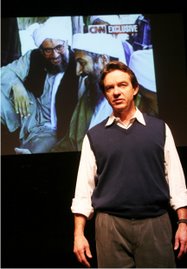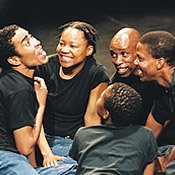Jonathan Hafetz testifies as to the existence of "black sites," secret prisons where "high-value detainees" are held incommunicado; even the Red Cross can't meet with them. These sites exist throughout Eastern Europe. These are the places where water-boarding has been practiced - even against detainees ultimately proven innocent.
Two very short interludes:
...The story of a man held without trial, tortured - a man who eventually confessed to whatever his torturers implied he did, just to avoid further torture.
...A statement by Condie that the U.S. will not/does not use torture.
Hafetz points out that of course if the U.S. it torturing, it has to tell everyone, "We're not torturing."
The President doesn't believe that international law restricts his actions (para).
"There are no legal restrictions." --> On what Bush can do with suspected terrorists.
Discussion of the order that led to Bush's powers to torture and use evidence gained via torture. (Read Hafetz's article about it in The Nation.)
Discussion of problems even Alexander Hamilton, not the most liberal of founding American dudes, foresaw regarding executive privilege and its extension to torture.
Bush spoke in support of the victims of torture and called upon the community of law-abiding nations in prohibiting torture.
Ratner: "Mr. Hafetz, was the president speaking the truth...?"
Hafetz: "Absolutely not."
(Just some background, Hafetz works at the Brennan Center with Aziz Huq, a Culture Project alum from a talk-back after Larry Wright's My Trip to Al-Qaeda. Protecting our right not to be tortured, among many other little legal things-you'd-like-to-keep-around, is something the Brennan Center thinkers know quite a bit about.)
Discussion of Bush's rejection of the Geneva Conventions, which previous president's found quite worth defending. But the president "cannot dispense with the Geneva Conventions."
Final question: Should B&C be impeached? Hafetz: Yes.
Monday, November 26, 2007
Subscribe to:
Post Comments (Atom)




No comments:
Post a Comment